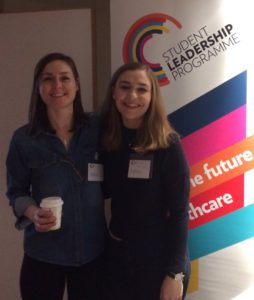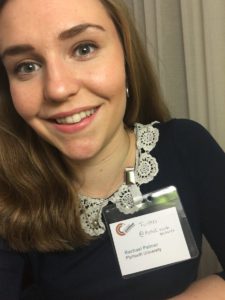1st Year Adult Nursing Student – Plymouth University
On the 5-6 March, myself and colleague and friend, Dawne Jones, attended the Student Leadership Programme launch. Unsure of what to expect, and who we would meet, we quickly met and got chatting to an array of student healthcare professionals from across the UK – from as far as Inverness! It was clear immediately that what brought us there was passion for making a difference, for the NHS, for strong and compassionate leadership in the health service and to share ideas on these issues with like minded people.
On day one we were welcomed and had a group discussion with Dr Katerina Kolyva, Executive Director of the Council of Deans of Health. We learnt about being ourselves when it comes to leadership and how it is situational, adapting yourself to the team you are working with and being authentic. We had a brilliant discussion around what makes us all unique and interestingly, in a room of 45 student healthcare professionals, the words ‘creative, resilient and persistent’ came up most often. This made me smile and think about the kinds of people that are going to be leading the NHS in the future and how it is in safe hands. The lasting remark was around how we maintain our leadership because of our behaviour and if you do not have a whole self-awareness of your development areas whilst negotiating through the complexities of some potential problems, then you may not be being the best leader you can be.
 Lots of engaging group exercises and presenting went on throughout both days, but the exercise that stood out for me most was discussing with each other what we would do as the nurse in charge in a particularly difficult scenario. It was clear to me that everyone brought a wealth of experience already, being from different backgrounds, ages, professions, locations – just listening was a privilege. And this discussion continued throughout dinner and beyond when we heard from Ismalia De Sousa a Clinical Nurse specialist in stroke at Imperial College Healthcare NHS Trust. Ismalia taught me that determination and passion is what ultimately makes a successful nurse leader. She was so self-aware and reflective on her practice, on situations she had encountered and on moments where she thought she wasn’t good enough. It encouraged me to think about my own practice and now I carry a journal with me on train journeys to placement or in my bag to jot down how I’m reacting to a situation in that moment and how I can learn from it.
Lots of engaging group exercises and presenting went on throughout both days, but the exercise that stood out for me most was discussing with each other what we would do as the nurse in charge in a particularly difficult scenario. It was clear to me that everyone brought a wealth of experience already, being from different backgrounds, ages, professions, locations – just listening was a privilege. And this discussion continued throughout dinner and beyond when we heard from Ismalia De Sousa a Clinical Nurse specialist in stroke at Imperial College Healthcare NHS Trust. Ismalia taught me that determination and passion is what ultimately makes a successful nurse leader. She was so self-aware and reflective on her practice, on situations she had encountered and on moments where she thought she wasn’t good enough. It encouraged me to think about my own practice and now I carry a journal with me on train journeys to placement or in my bag to jot down how I’m reacting to a situation in that moment and how I can learn from it.
On day two we heard from Joanne Bosanquet MBE, Deputy Chief Nurse of Public Health England and had another exhilarating debate, sharing stories and people’s passions for what they do. We talked about advocacy and being courageous, empowering patients and challenging people as a fresh pair of eyes. We are not just ‘the student’, we are people with our own experiences who know right from wrong or can look at problems with another perspective. We encouraged each other to not fall into the ‘pity pit’, being mindful of our own compassion and instead of simply pitying patients, ask questions and speak up for them – you are their advocate and voice. Equally the backbone of advocacy is empathy and we have to think as leaders and as nurses that we are in a position to challenge things as we can think about it from their perspective.
Later we had a lovely talk from Felicity Allman, fellow Plymouth University student in Mental Health Nursing. She participated in the programme last year and we heard her reflections about the course, what she learnt, who she had met and ambitions for the future. She encouraged us to think about our visions. What we see ourselves doing a few years down the line. I encourage anyone to do the same, it was so useful for us to answer the question “what you would attempt to do if you knew you could not fail?” This allowed me to think about my wildest ambitions for my career and how I can best achieve what I would like to. I suddenly realised that if this is the thing I would most like to do, then why not give it a go anyway? It’s written down in that journal and on its way to being realised.

That afternoon we also learnt about emotional intelligence and resilience from Adele Nightingale, Senior Lecturer in Healthcare Leadership Practice at the University of Central Lancashire. We talked about how resilience is the ability to be knocked back and come back bigger, better and stronger. To be resilient however, we need to have an element of emotional intelligence in which we are able to recognise how we are feeling and the feelings of others – being ‘people and self-smart’. The biggest learning point I took away from this session was that the “greatest asset you have is you” so if we do not look after ourselves as healthcare professionals by reflecting on our learning experiences and developing our support network through self and social awareness, then we are not able to best look after our patients.
Last but not least, we heard from Nigel Harrison Executive Dean of the Faculty of Health and Wellbeing at the University of Central Lancashire. This was a beautiful tale of Nigel’s personal life and how he overcame challenges to be the leader he is today. It became clear to me that healthcare leaders are not necessarily those that shine academically, race to the top or shout the loudest, but those who have the drive to make a difference and the determination to just be the best that they can be for themselves and others.
Since we said our goodbyes and headed home on the train, we have found out who our mentors are for the next phase of the programme. I am excited to meet with Bronagh Scott, Executive Director of Nursing at Aneurin Bevan University Health Board and develop a plan for the future as to how best I can develop into the nurse I want to be. Then we all meet again in London in July for a networking event. It will be great to see how everyone is doing and the doors the programme has opened for them. I for one have exciting plans for the future and I am so grateful for this opportunity.
By Rachael Palmer
